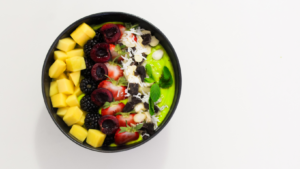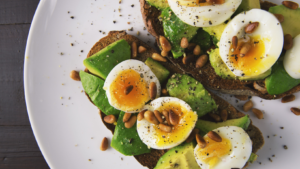Just as humans strive for balanced, nutritious meals, our furry friends deserve the same attention to their dietary needs. This article will delve into the world of healthy diet dog food, a topic that’s increasingly gaining attention among pet owners worldwide.
We’ll explore the benefits of a well-rounded diet for dogs, the key ingredients to look for, and how to make the transition from standard to healthier options. Whether you’re a seasoned dog owner or a newbie, this article will provide valuable insights into keeping your canine companion healthy and happy. So, let’s dive into the fascinating world of healthy diet dog food.
Healthy Diet Dog Food
 Grasping canine nutrition lays a robust foundation for making informed decisions about dog food. This section critically examines the importance of balanced diets and necessary nutrients for dogs.
Grasping canine nutrition lays a robust foundation for making informed decisions about dog food. This section critically examines the importance of balanced diets and necessary nutrients for dogs.
A balanced diet holds paramount importance for dogs’ health and wellbeing. Just as humans thrive better with a varied diet, dogs, too, derive maximum benefit from a well-rounded diet. Every meal dogs consume contributes toward their overall health, affecting everything from their fur quality to their energy levels. A balanced diet provides dogs with the energy they need for daily activities, helps maintain a healthy weight, supports the immune system, and promotes longevity. For example, kibbles, a diet staple in many dog dishes, can be a source of necessary nutrients when complemented with other foods like meats, veggies, and grains.
Key Nutrients Dogs Need
Properly balanced dog diets comprise several key nutrients. Primarily, these should include proteins, carbohydrates, fats, vitamins, and minerals. Proteins are crucial for healthy muscle growth and skin health, often sourced from meats like chicken, beef, and fish. For instance, an adult dog’s diet requires 18% protein.
Decoding Dog Food Labels
 To make informed choices about healthy diet dog food, one must understand the labels on dog food packaging. This section explains how to recognize healthy ingredients and spot unhealthy fillers and additives. Healthy ingredients in dog food serve a specific purpose — they provide necessary nutrients for your dog. Proteins are typically the main ingredient and it’s common to see actual meats like chicken, beef, or lamb. Dog food comprising fish offers a fantastic source of Omega-3 fatty acids, aiding in maintaining a shiny coat and healthy skin. Whole grains such as barley or brown rice provide carbohydrates, necessary for energy, whereas fruits and vegetables offer critical vitamins and minerals. For instance, spinach contributes vitally to eye health, and blueberries infuse antioxidants to support the immune system.
To make informed choices about healthy diet dog food, one must understand the labels on dog food packaging. This section explains how to recognize healthy ingredients and spot unhealthy fillers and additives. Healthy ingredients in dog food serve a specific purpose — they provide necessary nutrients for your dog. Proteins are typically the main ingredient and it’s common to see actual meats like chicken, beef, or lamb. Dog food comprising fish offers a fantastic source of Omega-3 fatty acids, aiding in maintaining a shiny coat and healthy skin. Whole grains such as barley or brown rice provide carbohydrates, necessary for energy, whereas fruits and vegetables offer critical vitamins and minerals. For instance, spinach contributes vitally to eye health, and blueberries infuse antioxidants to support the immune system.
Spotting Unhealthy Fillers and Additives
 Not all ingredients in dog food contribute positively to a dog’s health. Some substances act as fillers, contributing little to no nutritional value. These include ingredients like corn syrup, soy, wheat, beet pulp, and certain flours. These elements are often used to cut costs, and prolonged consumption can lead to health issues like obesity and digestive concerns. Likewise, synthetic preservatives are another component to watch for in dog food labels. Chemicals including BHA, BHT, or Ethoxyquin are common examples, used to extend shelf life but have potential to cause serious health complications. Therefore, preferring dog food with natural preservatives such as Vitamin E or C becomes imperative.
Not all ingredients in dog food contribute positively to a dog’s health. Some substances act as fillers, contributing little to no nutritional value. These include ingredients like corn syrup, soy, wheat, beet pulp, and certain flours. These elements are often used to cut costs, and prolonged consumption can lead to health issues like obesity and digestive concerns. Likewise, synthetic preservatives are another component to watch for in dog food labels. Chemicals including BHA, BHT, or Ethoxyquin are common examples, used to extend shelf life but have potential to cause serious health complications. Therefore, preferring dog food with natural preservatives such as Vitamin E or C becomes imperative.
Understanding dog food labels forms a critical part of ensuring a healthy and balanced diet for your dog. Awareness about healthy ingredients and unhealthy fillers and additives empowers dog owners to make well-informed decisions about their pet’s nutrition.
The Role of Dog’s Age and Breed in Their Diet
Every dog’s age and breed plays a vital role in determining his diet. Let’s explore this relationship more deeply.
Each breed exhibits, its own specific dietary requirements. For example, small breeds like Pomeranians and Chihuahuas require high-calorie food due to their fast metabolism. Conversely, larger breeds such as Great Danes and Saint Bernards necessitate diets low in fat and high in fiber, preventing obesity. Likewise, certain breeds like Dalmatians carry a unique dietary necessity, and should avoid foods high in purines, as they’re prone to urinary stones.

